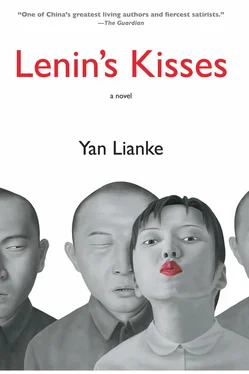One group after another poured into the valley. The blind were pulling carts with paraplegics riding on top, directing them where to go. Deaf and mute people were toting carrying poles, shouting and signing. Cripples were leading oxen and goats, and when the animals stopped walking the cripples would beat them with a stick to urge them on. There were wholers pulling carts, on which there were no possessions, only children and the elderly. Some of the children were blind or mute, and the blind ones would ask a question while the mute ones would sign something in response, but since the former couldn’t see what the latter were signing they would inevitably start fighting. In this way, the procession gradually moved toward the mountain ridge where Liven was located.
As the villagers returned from escorting the coffin, they stood on the side of the road staring in surprise. They asked, “Where are you moving to?”
The people in the procession asked in return, “Are you from Liven?” They said, “We have come from far away, where the government built a dam and forced everyone in the way to move. They gave every family a sum of money, and said that we could either relocate together or each take the money and relocate separately.” They said, “We have already found a new location, which is even better than this village in the depths of the Balou mountains.” They said that Liven was located at the junction of Shuanghuai, Gaoliu, and Dayu counties, while the place where they were going was located at the junction of six different counties, including Baishizi, Qingshui, Mianma, and Wanbozi, where there was a small gorge that didn’t appear on any administrative map and didn’t fall under anyone’s control or jurisdiction, and in which there was fertile soil and abundant water. Therefore, these hundreds of disabled people had all agreed to relocate to that gorge in order to pitch a camp and establish a village, to farm the land and liven.
They said, “Don’t worry. We will enjoy a better life than you have here in Liven.”
The villagers asked, “And where exactly is this place you are talking about?”
They replied, “It is over on the far end of the Balou mountains, on the other side of Spirit Mountain.”
While this conversation was still going on, the migrants began pulling their carts and hoisting their carrying poles. Then they bade farewell to Liven and the villagers and proceeded into the depths of the Balou mountains. The residents of Liven stood on the mountain ridge path and gazed at that slowly disappearing crowd of hundreds of blind, crippled, deaf, and mute disabled people from the land of wholers.
The villagers waited until their shadows had faded into the distance, then continued toward Liven, looking as though they had just lost something. When they passed Sister Hua Slope, 3they looked at the mountainside full of fertile soil, which was not planted with crops but instead was full of carriage-wheel chrysanthemums, moon grass, and green summer flowers. The villagers said,
“We’ve already withdrawn from society. Why are we still sowing loose earth?” 5
Others said, “Of course we’re sowing loose earth. Having loose days, 7how could we not sow loose earth?”
Someone asked, “What is this about having a Dragon Day, 9Phoenix Day, 11or Old People’s Day 13on these loose days?”
Someone replied, “Don’t ask me. Now that Grandma Mao Zhi is gone, you should ask whoever is the eldest.”
Someone asked, “Then how do you sing the livening song?” 15
“Now that Grandma Mao Zhi has departed, I’m afraid there is probably no one who remembers the words.”
Someone else asked, “Now that Grandma Mao Zhi is gone, who will manage the village’s affairs?”
Someone else replied, “Given that no one here manages anyone else, why do we need anyone to handle things?”
At that point, a paraplegic, a cripple, and a blind man reached Liven. When they arrived in the village, a pregnant Huaihua was waiting for them at the entrance to the village, an astonished look on her face. When she saw the villagers returning from the funeral, she called out to them from a distance,
“Chief Liu has had a car accident. . . Both of his legs are broken, and furthermore he is no longer the county chief. . He has come to live in Liven. At the moment he is in the temple guest house. He said that he will stay there from now on.”
The villagers at the entrance to the village all stared in astonishment. Tonghua, Yuhua, and Mothlet stood in the crowd like chicks that had just fallen from the nest. Their mother, Jumei, was right behind them, pale from shock, as though someone had just hit her or kissed her.
The villagers all stared at one another, not knowing what to do. Only One-Legged Monkey looked pleased.
In this way, Chief Liu settled down to live in Liven, becoming one of the village’s disabled residents.
As for Huaihua, she gave birth six months later. She gave birth to a thin and frail daughter.
Although it was a daughter, at least she belonged to the next generation. As for what the future held, only the future would tell.
CHAPTER 3: FURTHER READING — SISTER HUA SLOPE, HOLIDAY, AND LIVENING SONG
1) Departed.The term means “to die,” but also connotes a degree of respect for the deceased. This is the way in which people in Balou pay their respects when someone highly esteemed passes away.
3) Sister Hua Slope.“Sister Hua Slope” is the name of a place in the village of Liven, and “Sister Hua” is the name of a person. Everyone in Liven knows the story of Sister Hua and of Sister Hua Slope.
It’s said that the story began four jiazi cycles ago, in the gengzi Year of the Rat, when Sister Hua was seventeen years old. One of her parents was deaf and the other was mute, and while Sister Hua herself had sharp hearing and a sweet voice, her legs didn’t work very well. She nevertheless had a graceful beauty, with skin as white as pristine clouds in the sky, beneath which there was a shade of light pink like that of a water orchid.
Sister Hua lived with her parents on a mountain slope not far from Liven, in a house consisting of several thatched rooms and a well. The family had oxen and goats, chickens and ducks, and the soil on the slope was so fertile that if you stuck a chopstick in it, it would immediately start budding.
One day followed the next, and by the time Sister Hua turned seventeen she was already one of the most beautiful women anyone had ever seen. It was in that year, at the height of the Qing dynasty, as the entire realm was enjoying peace and prosperity, that a young man coming from Xi’an attempted to cross over Funiu Mountain to reach the Shuanghuai county seat, where he had been assigned an official post. But because the young man felt the route was too long, he decided to cut across the Balou mountains. By the time he arrived in Liven he was parched, and he proceeded to Sister Hua’s house to request a bowl of water. It was there that he encountered Sister Hua herself.
As he stood in front of her house holding a water bowl, he noticed that the crops Sister Hua’s parents had planted were growing exceptionally well. The wheat stalks on the mountain slope were full of grain, and a single year’s harvest would give them enough grain to last them another three years. Closer by, there was row upon row of bundled corn hanging under the house eaves from previous years, and even if the village were to have poor harvests for the next decade the family would still have more corn than it could eat. All of the vegetables, flowers, and sunflowers planted in front and back of the house were in full bloom, bright red in the springtime and green in the summer, with carriage-wheel chysanthemums, white mountain orchids, and moon grass combining with cloudy shade and red sunlight. There were also wild purple wisteria and chaste tree shrubs, geckos climbing the walls, and red flowers and green willows, vegetation and plant fragrance everywhere.
Читать дальше












